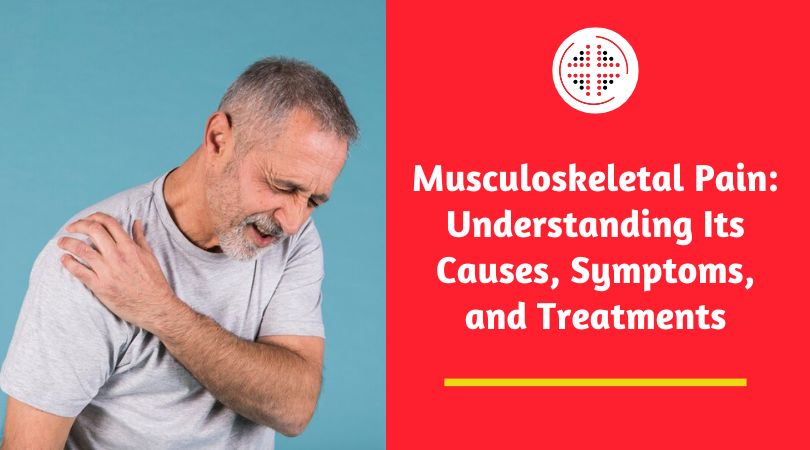Musculoskeletal pain is a common problem that affects millions of Americans each year. According to the National Institutes of Health (NIH), an estimated 1 in 4 adults in the US experience musculoskeletal pain on any given day. This pain can originate from various structures in the body, including muscles, bones, joints, tendons, ligaments, and nerves. It can range from a dull ache to a sharp, debilitating pain, significantly impacting daily activities.
Continue reading to learn more about musculoskeletal pain, covering its types, causes, symptoms, and treatment.
What Is Musculoskeletal Pain?
Musculoskeletal pain refers to pain or discomfort affecting ligaments, muscles, joints, bones, and tendons. It can be acute, characterized by sudden and severe discomfort, or chronic, lasting for an extended period. It may develop as localized pain in a specific area of the body or as widespread pain affecting the entire body.
What Are the Types of Musculoskeletal Pain?
- Joint Pain: It is often accompanied by stiffness and inflammation. Rest usually helps alleviate joint pain, while physical activity worsens it.
- Tendon and Ligament Pain: It may occur due to strains, sprains, or overuse injuries, as these tissues connect joints and bones.
- Muscle Pain: Muscle cramps, infections, and spasms can cause it, injuries, or tumors.
- Bone Pain: While usually results from injuries like bone fractures or other musculoskeletal injuries, a tumor can also cause bone pain.
What Causes Musculoskeletal Pain?
Medical conditions and other factors contributing to musculoskeletal pain include:
- Poor posture
- Sprains
- Overuse injuries
- Bone fracture
- Joint dislocation (when a joint moves out of its position)
- Injuries to bones, muscles, or joints
- Musculoskeletal disorders (arthritis, lupus, osteoporosis, gout, etc.)
- Prolonged bed rest
What Are the Symptoms of Musculoskeletal Pain?
Common symptoms of musculoskeletal pain are:
- Fatigue
- Muscle twitches
- Pain that worsens with movement
- Aching and stiffness
- Difficulty sleeping
- Burning sensations in the muscles
- Popping or cracking sound in the joint
- Bruising, swelling, redness, and soreness
- Difficulty moving the affected area
Also, the nature and intensity of the pain vary depending on its location.
- Joint pain feels like an ache, accompanied by stiffness and swelling.
- Bone pain may feel dull, stabbing, sharp, or intense.
- Tendon pain from an injury can be sharp and worsens when you move or stretch the affected area.
- Muscle pain can be intense and acute if caused by a cramp or severe muscle contraction (Charley Horse).
How Is Musculoskeletal Pain Diagnosed?
Your provider will review your medical history, symptoms, and ask questions about:
- Having other symptoms, such as a fever or rash
- Activities that worse or ease your pain
- The duration of your pain (whether acute or chronic)
Then, your provider may perform a physical exam, touching or moving the affected area to determine the intensity and severity of your pain.
For a complete diagnosis or to rule out the underlying conditions, they may order the following tests:
- Blood Tests: To check for arthritis or signs of inflammation.
- X-rays or CT Scans: To look for bone injuries or fractures.
- MRI Scans: To check for injuries in soft tissues such as ligaments, muscles, and tendons.
- Joint Fluid Testing: To check for infections or the crystals that cause gout.
How Is Musculoskeletal Pain Treated?
Depending on the causes, symptoms, and severity of your pain, your provider may recommend any of the following treatment options:
- Pain relievers
- Therapeutic massage
- Physical therapy
- Steroid injections
- Occupational therapy
- Acupuncture
- Chiropractic adjustment
- Splints
- Devices (braces, taping, orthotics, and lumbar support)
- Joint replacement
- Arthroscopy
- Soft tissue and cartilage repair
- Laminectomy
How Is Musculoskeletal Pain Prevented?
To prevent or reduce your musculoskeletal pain, you should:
- Practice good posture when sitting and standing.
- Avoid repetitive activities that lead to overuse injuries.
- Practice proper lifting techniques to avoid sprains and injuries to bones, muscles, or joints.
- Exercise regularly to strengthen your bones, muscles, and joints.
- Use ergonomic furniture, such as a work-supportive chair and desk setup, to maintain proper posture.
When Should You Seek Medical Care for Musculoskeletal Pain?
Visit your urgent care provider if:
- Pain interferes with your everyday activities or limits your functionality
- You experience severe pain from a sudden injury
Get Expert Care for Musculoskeletal Pain at MI Express Urgent Care
If you are looking for quick and effective musculoskeletal pain treatment, look no further than MI Express Urgent Care. Our urgent care providers specialize in diagnosing and treating various musculoskeletal conditions, from strains and sprains to fractures and dislocations. With convenient location and business hours, we are committed to providing prompt and quality care when needed. Contact us today to eliminate your pain and feel your best.


